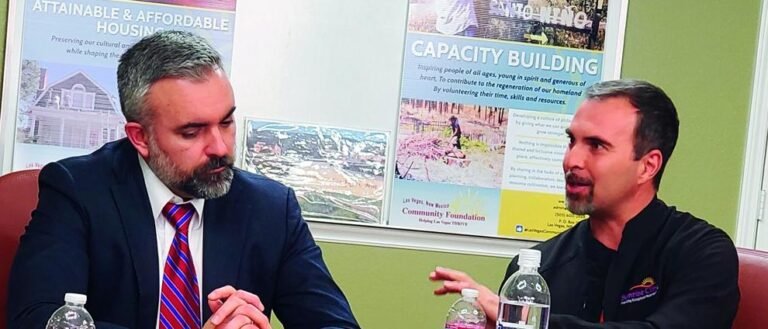Local healthcare leaders voiced deep concerns to New Mexico Attorney General Raúl Torrez during a roundtable discussion held Tuesday in Las Vegas, New Mexico. The focus was on the urgent need for more physicians, improved access to mental healthcare, and reducing the number of patients sent out of town for treatment.
The meeting, organized by the Las Vegas New Mexico Community Foundation, took place at the foundation’s new location on 606 Douglas Avenue. Leaders from local hospitals, clinics, and health organizations joined AG Torrez to discuss the most pressing issues in rural healthcare.
AG Torrez Hears from Rural Health Providers
Attorney General Torrez said he wanted to hear directly from those serving rural communities to better understand the gaps in the healthcare system.
“There have been some things specifically within the healthcare space that I’m concerned about,” said Torrez. “Some of those concerns come from major policy changes at the national level.”
Torrez noted his office has joined other Democratic attorneys general in legal actions against the Trump administration over policy shifts that have affected healthcare access for veterans, SNAP benefits, and emergency preparedness efforts.
“I have an obligation to make sure our citizens have access to the services and programs they are legally entitled to,” Torrez emphasized.
Local Hospital CEO Stresses Need for Mental Health Access
Helen Ballantyne, CEO of Alta Vista Regional Hospital, stressed the growing mental health crisis in Las Vegas. She explained that many patients in need of mental health services end up in the emergency room repeatedly because they cannot get proper care in the community.
“Even though the New Mexico Behavioral Health Institute is located in Las Vegas, we can’t easily access its resources because it’s a state-run facility,” Ballantyne said. “They serve patients from all across New Mexico.”
As a result, many individuals are transferred out of Las Vegas—and sometimes even out of state—for psychiatric treatment. This creates both emotional stress for families and financial strain on the local system.
Rural Residency Program Could Help Solve Doctor Shortage
Ballantyne also pushed for the creation of a rural residency program to help recruit and retain doctors in the area. The idea gained support from Dr. Randal Brown, a local physician and Guadalupe County Commissioner.
Dr. Brown recommended that AG Torrez help convey the benefits of a rural training program to state lawmakers.
Dr. Matthew Probst, another physician and rural health advocate, discussed Senate Bill 380 (SB 380), which aimed to expand rural medical training. Although the full bill did not pass the Senate Finance Committee, a pilot project connected to the bill was approved for funding.
The pilot, run through the University of New Mexico (UNM) Family Residency Program, will begin in Silver City. This hybrid model would allow doctors-in-training to split time between UNM and a rural community. If successful, Las Vegas could become one of the next training sites.
“We’ve already been working on this project for a year as part of our residency planning grant,” Probst said. “If the pilot works, it will benefit the entire state.”
Missed Tax Relief for Medicaid Providers
Dr. Probst also brought up House Bill 014 (HB 014), known as the Tax Package, which was recently vetoed by Governor Michelle Lujan Grisham. One of its provisions would have waived gross receipts tax for healthcare providers treating Medicaid patients.
He noted that rural areas with high Medicaid populations would have benefited significantly from the tax break, which could have helped small clinics and solo providers stay afloat.
Federal Policy Impacts on Rural Health
Elmo Baca, Executive Director of the Las Vegas New Mexico Community Foundation, said he appreciated AG Torrez’s interest in understanding how changes at the federal level affect rural healthcare.
“I think the attorney general is concerned about the impact of federal policy and funding changes on healthcare in places like ours,” Baca said.
He added that the roundtable was also valuable because it gave local healthcare providers a chance to talk with each other, something that doesn’t happen often enough.
“Alta Vista, Sunrise Clinic, Presbyterian Health Services, and the Anchorum Foundation were all present,” said Baca. “It gave everyone a chance to compare notes and gain a clearer picture of the healthcare challenges we all face.”
Looking Ahead
As rural communities in New Mexico continue to navigate limited healthcare resources, roundtable discussions like this one offer a critical opportunity for collaboration and advocacy. Local leaders hope that with support from the Attorney General and other policymakers, rural areas like Las Vegas can build a stronger, more accessible healthcare system for everyone.







